
A Mexican national is someone legally recognized by the Mexican government as belonging to the country, either by birth, descent, or naturalization.
If you were born in the U.S. to Mexican parents, you may already qualify without knowing it, even if the consulate turned you away before.
But knowing that you qualify is only the first step.
You still need to figure out how to apply, what documents are required, and whether your specific family situation makes the process easier or harder. That is where most people get stuck.
We help people across the U.S. secure their Mexican nationality without consulate visits, even if they were previously denied.
Our licensed team handles everything, from correcting birth certificates to finding long-lost documents, and we do it with clarity, speed, and heart.
If you are ready to claim what is already yours, keep reading.
We will walk you through everything you need to know to grasp your rights and your next move.
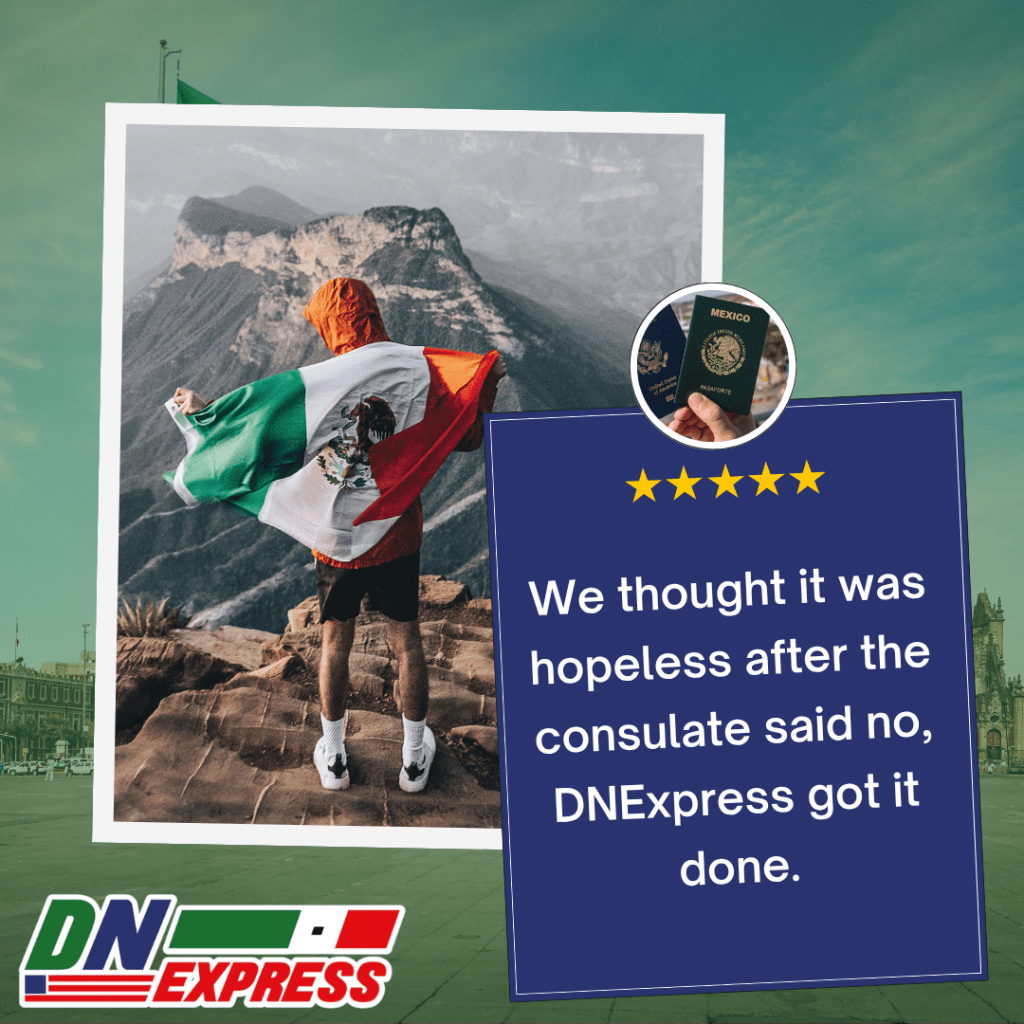
What Is a Mexican National?
A Mexican national is someone who the Mexican government legally recognizes as belonging to the country, either by birth, descent, or through naturalization.
This legal status goes beyond a symbolic label. It is a legal standing backed by the Mexican Constitution that grants rights, protections, and obligations within Mexico and abroad.
According to Article 30 of the Mexican Constitution, nationality can be acquired in two main ways:
By birth: If you were born in Mexico or born abroad to at least one Mexican-born parent, you are considered Mexican by birth, even if you never registered it or lived in Mexico.
By naturalization: This applies to foreign nationals, like spouses of Mexican citizens or long-term residents, who meet specific legal criteria and apply through the Secretaría de Relaciones Exteriores (SRE).
In contrast, citizenship, defined under Article 34, refers to the political rights that come after nationality, such as voting and holding office. You must be a Mexican national to become a citizen, but not all nationals are citizens (especially minors).
Rights of a Mexican National
Being a national gives you access to:
- A Mexican passport, which provides visa-free access to over 150 countries.
- The legal right to inherit land or property in restricted zones (like coastal or border regions) that foreigners cannot legally own.
- Eligibility for healthcare, public education, and residency privileges in Mexico.
You also gain legal identity in Mexico’s civil registry, which opens doors for marriage, property, business, and inheritance.
What Does It Mean to Be a Mexican National in the United States?
It means you have dual recognition: American by birth, and Mexican by right of bloodline or application.
El U.S. government allows dual citizenship, so you do not lose your American rights by claiming your Mexican nationality.
This dual status lets you move, invest, and belong on both sides of the border without legal conflict.
What Is a Non-Mexican National?
A non-Mexican national is anyone who does not meet Mexico’s constitutional definitions of nationality by birth or naturalization. This includes most foreigners, regardless of how long they have lived in Mexico, who have not formally applied for Mexican naturalization or do not have Mexican ancestry.
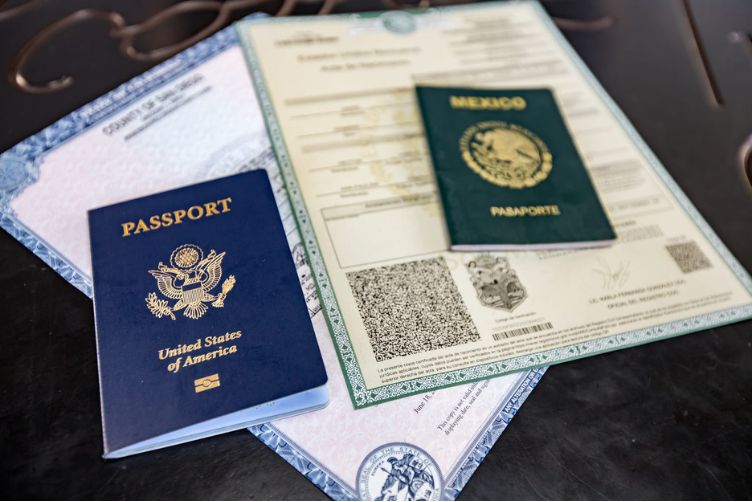
How to Become a Mexican National
There are two main legal pathways to become a Mexican national: by birth and by naturalization.
Your eligibility depends on your family background, birthplace, and life circumstances. Here is what each route involves.
By Birth (Nacionalidad por nacimiento)
Under Article 30 of the Mexican Constitution, you are a Mexican national by birth if:
- You were born in Mexico, regardless of your parents’ nationality.
- You were born outside of Mexico to at least one Mexican parent who was born in Mexico.
- You were born on Mexican ships or aircraft, whether military or commercial.
👉 This means many U.S.-born individuals are already eligible, often without knowing it, by having a Mexican-born parent.
Worried you do not speak Spanish well? That is okay. Spanish fluency is not required to apply for or claim nationality by birth.
DNExpress works with English-speaking clients every day.
By Naturalization (Nacionalidad por naturalización)
If you were not born Mexican and do not have a Mexican parent, you may still qualify for nationality by naturalization.
This is frequent for:
- Spouses of Mexican citizens (typically after 2 years of living in Mexico together).
- Permanent residents who have lived legally in Mexico for 5+ years.
- Foreigners who have made notable contributions to Mexican culture, economy, or society.
This process involves an application with Mexico’s Secretaría de Relaciones Exteriores (SRE), a Spanish-language exam, and proof of residence or marriage.
Tip: If you are a spouse of a Mexican national, we can help you determine if you're eligible for nationality or residency and prepare your application without costly delays.
Frequent worries
- How to be a Mexican national? → By proving you were born in Mexico, born to a Mexican parent, or completing the naturalization process.
- How do you become a Mexican national? → By presenting birth or parental documents (for nationality by birth), or applying through the SRE (for naturalization).
- What are Mexican nationals called? → They are referred to as “nacionales mexicanos” under the law, regardless of whether they are citizens or residents.
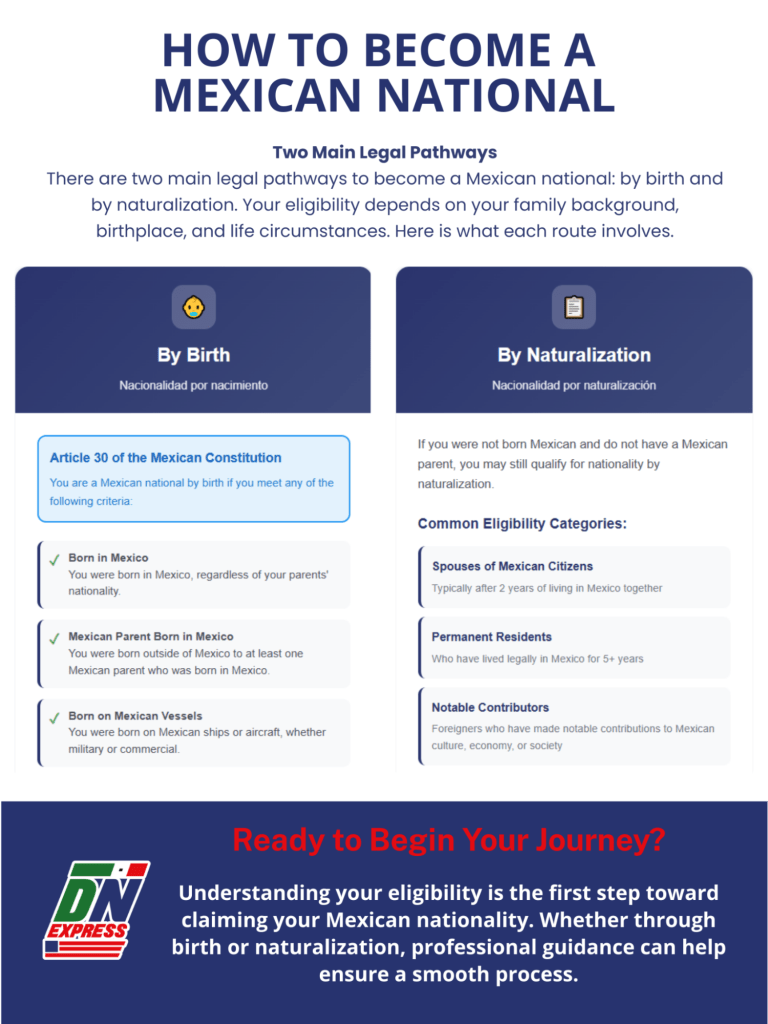
Why Many People Do Not Realize They Already Qualify
Thousands of people across the U.S. qualify as Mexican nationals and do not even know it.
The law is clear, but public awareness is not. Here is why so many eligible individuals never apply.
1. Cultural Myths That Discourage People
We constantly hear things like:
- “I missed the deadline.”
- “My dad passed away, so it is too late.”
- “I was born here, not in Mexico, so I cannot apply.”
- “I thought you had to live in Mexico or speak fluent Spanish.”
These are not true. Under Article 30 of the Mexican Constitution, there is no age limit, no expiration, and no language requirement for those qualifying by birth. You do not even need to live in Mexico.
2. Bureaucratic Barriers & Bad Experiences
Even when people try to apply, they often run into walls like:
- Lost or incorrect documents (e.g., name mismatches).
- Denied appointments at the consulate.
- Vague instructions or no follow-up from authorities.
- No clear path forward if something goes wrong.
These situations cause frustration, leading many to give up, even though their case is fixable.
3. The Consulate Is Not the Only Option
Another major reason people delay or give up is believing the consulate is the only route. But it is not.
Doble Nacionalidad Express can handle the entire process without you needing to visit the consulate at all.
We have helped clients whose consulate appointments were canceled, delayed for over a year, or outright denied, and turned those cases around completely.
“If my Mexican parent is not on my U.S. birth certificate, can I still apply?”
Yes. Even if your Mexican parent is not listed, you can still apply. We have handled many cases like this.
With legal declarations, alternate documents, or even DNA tests, you can establish the parental link required for nationality.
A missing name on the certificate does not disqualify your application.

Benefits of Mexican Nationality
Becoming a Mexican national is about unlocking tangible, lifelong opportunities for you and your family.
Here are some of the biggest benefits that come with claiming your legal identity.
1. Get a Mexican Passport
Once registered as a Mexican national, you're eligible to apply for a Mexican passport, which allows:
- Legal travel in and out of Mexico without restrictions.
- Dual-national convenience at airports, borders, and checkpoints.
- Proof of identity when handling legal or civil matters in Mexico.
How strong is a Mexican passport? → It ranks 22nd globally, offering visa-free or visa-on-arrival access to 159 countries, including most of Latin America, the EU, and Japan.
2. Inherit Property or Land in Mexico
Only Mexican nationals can inherit or directly own land in certain restricted zones (like beachfront and border regions).
Dual nationality simplifies:
- Real estate transfers from relatives.
- Legal claims on family land.
- Bypassing fideicomisos (trust arrangements required for foreigners).
3. Live, Work, and Study Freely in Mexico
As a national, you do not need to apply for visas or permits to:
- Enroll in public or private schools.
- Apply for jobs in the public or private sector.
- Open bank accounts, start a business, or obtain a driver’s license.
You also gain access to Mexico’s public healthcare system and retirement benefits, if you choose to live there long-term.
4. Keep Your U.S. Citizenship
Dual nationality is legal and protected. You do not have to give up your American passport, identity, or rights.
You get the best of both countries: economically, culturally, and legally.
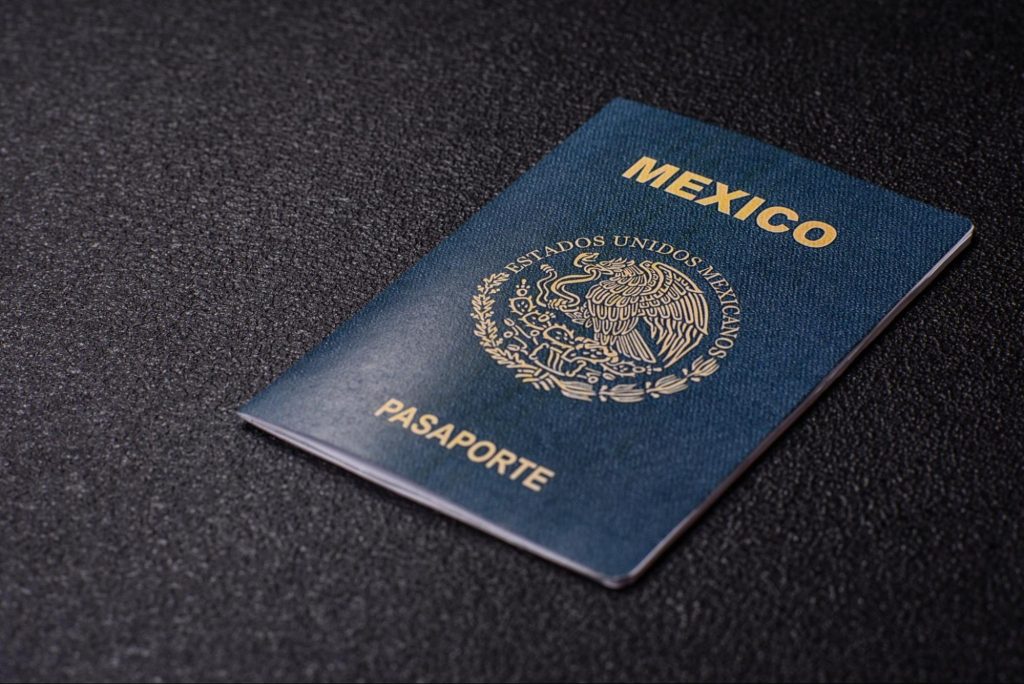
Why You Should Not Do This Alone
Securing your Mexican nationality is your legal right, but the process can be frustrating, confusing, and even defeating if you try to handle it on your own.
Here is why so many people abandon the journey, and how Doble Nacionalidad Express changes that.
The Downsides of Doing It Yourself
Most self-guided applications fail for one of three reasons:
- Technical mistakes: Incorrect apostilles, mistranslations, or mismatched birthdates and surnames. Even a small typo can cause rejection.
- Consulate delays: Appointments can take 6 to 12+ months to schedule and often get canceled without notice.
- No clear path: Most people do not know whether they qualify, what documents to gather, or how to respond after a rejection.
Worry: “The consulate ghosted me and never rescheduled.” → We hear this all the time.
That is why more families are turning to legal teams like ours for a faster, more reliable route.
Why Work with DNExpress
We built our firm for families who were ready to give up, people who were told “no,” lost documents, or felt overwhelmed by the system.
Our services remove the guesswork and put your case in capable hands.
With our team, you get:
- No consulate visits required. We handle it remotely.
- Every case handled by licensed Mexican attorneys, no middlemen.
- We specialize in complex, rejected, or “impossible” cases. This is our focus.
- A fully bilingual team with transparent pricing and U.S.-based support.
- Over 3,000 successful cases across all 50 states and abroad.
Key Point: You do not need your parents. You do not need to speak Spanish. And you do not need to go to Mexico.
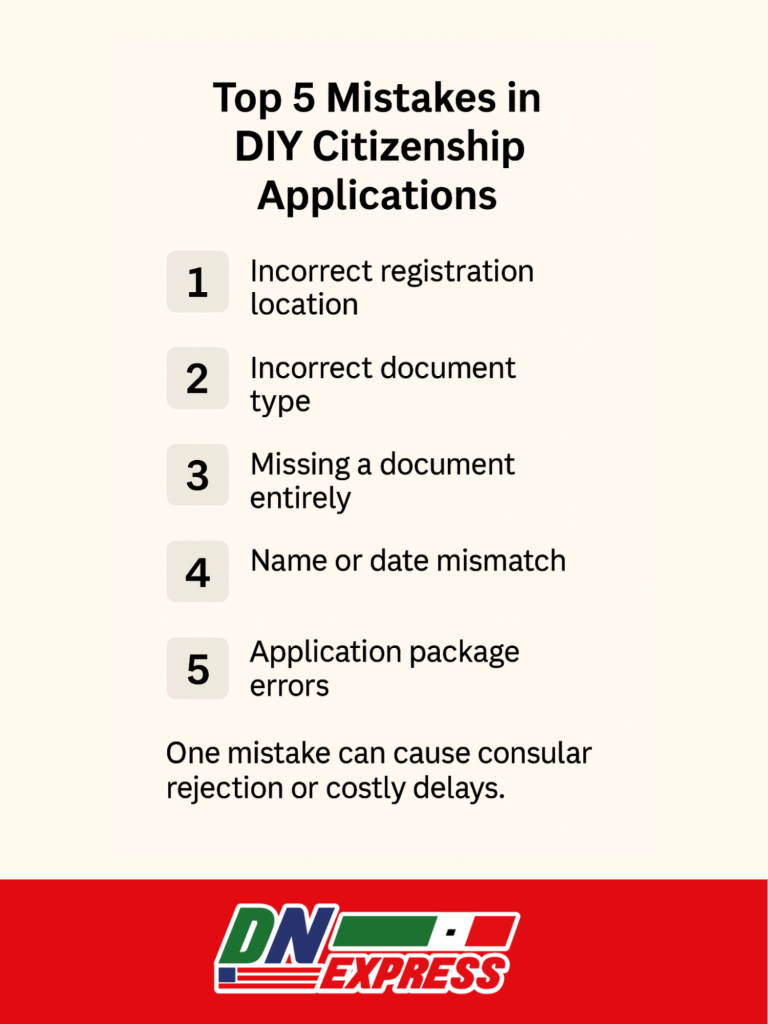
Client Stories
We do not file paperwork. We help people reclaim their identity, restore their legal rights, and reconnect with their roots.
Here is what that looks like for our clients:
“I was told I did not qualify for dual citizenship. DNExpress proved that wrong.”
One of our clients, a U.S.-born adult with a deceased Mexican father, had been rejected by the consulate. She assumed the door was closed.
Our legal team reviewed her documents, filed corrective paperwork, and successfully registered her as a Mexican national, all without her leaving the U.S.
“My documents were all messed up, but they fixed everything and now I have my passport.”
A father came to us after three failed attempts at applying due to mismatched names and incorrect birthdates.
We retrieved new records from Mexico, submitted legal declarations, and got him his Mexican passport within 10 weeks.
“They helped me register my daughter without ever going to the consulate.”
A mom in California wanted her daughter to grow up connected to her heritage.
We completed the entire process remotely, obtained her daughter’s Mexican birth registration, and mailed the documents to her door. No consulate, no stress.
Every story is different. But the outcome is the same: clear answers, legal recognition, and a deep sense of belonging.
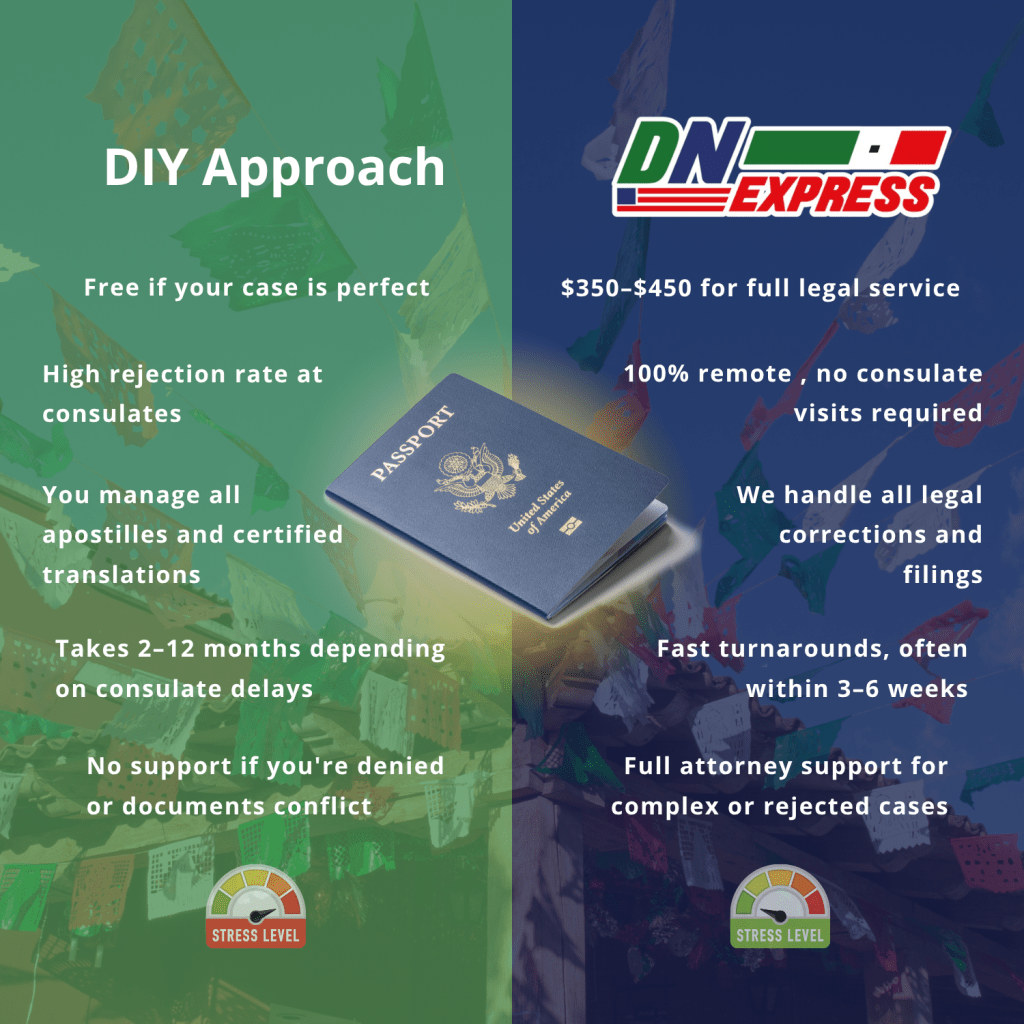
Your Next Step
If you have read this far, chances are you're eligible, or know someone who is.
Whether you are starting from scratch, fixing old paperwork, or recovering from a rejection, we are here to help.
We make it simple, fast, and legally sound. No consulate visit required, no guessing, no wasted time.
👉 Schedule a Free Case Review. We will evaluate your eligibility and map out your legal pathway to Mexican nationality, completely free.
📱 Message Us on WhatsApp. Need a quick answer? Send us a message. Our bilingual legal team is standing by.
No matter your situation, whether your documents are a mess, your case was rejected, or you do not know where to start, we believe you deserve to belong.
Let us help you claim what is already yours.
Frequently Asked Questions About Mexican Nationality
1. What does it mean to be a Mexican national?
Being a Mexican national means you are legally recognized by the Mexican government as belonging to the country, either by birth, descent, or naturalization. It gives you rights like a passport, land inheritance, and residency privileges in Mexico.
2. Can I be a Mexican national if I was born in the U.S.?
Yes. If at least one of your parents was born in Mexico, you likely qualify for Mexican nationality, even if you have never lived in Mexico or were never registered.
3. Do I lose my U.S. citizenship if I become a Mexican national?
No. The United States and Mexico both allow dual nationality. You can legally hold both passports and enjoy the benefits of both countries.
4. What is the difference between nationality and citizenship in Mexico?
Nationality refers to your legal belonging to Mexico, while citizenship gives you political rights, like voting. All citizens are nationals, but not all nationals (such as minors) are citizens.
5. Can I apply through my grandparents?
Not directly. But if your Mexican-born grandparent’s child (your parent) is still alive or can be registered, you may qualify through them. We can help build multi-generational cases.
6. What if my Mexican parent is not on my U.S. birth certificate?
You can still apply. We use legal declarations, DNA evidence, or alternate documents to prove your lineage and qualify you under Article 30 of the Mexican Constitution.
7. Do I need to speak Spanish to apply?
No. If you are applying by birthright (through a Mexican parent), there is no language requirement. Our team works entirely in English if needed.
8. What is a non-Mexican national?
A non-Mexican national is anyone who does not meet the criteria for Mexican nationality, typically foreigners without Mexican ancestry or without completing naturalization.
9. How long does the process take?
With our firm, most clients receive confirmation of nationality within 8 to 14 weeks, depending on document availability. No consulate visit is required.
10. Can I get a Mexican passport through Doble Nacionalidad Express?
Yes. Once your nationality is confirmed, we can help you apply for a Mexican passport and have it mailed to your address, without the need for a consulate appointment.



